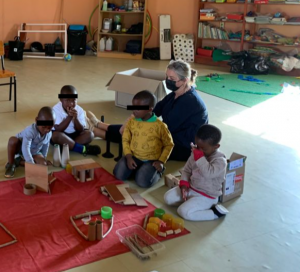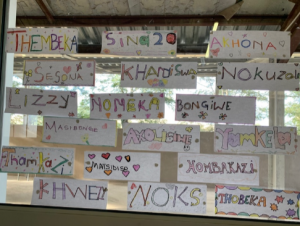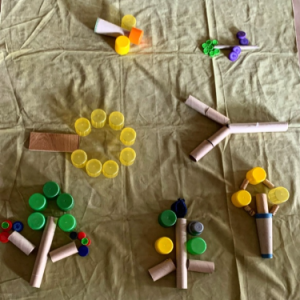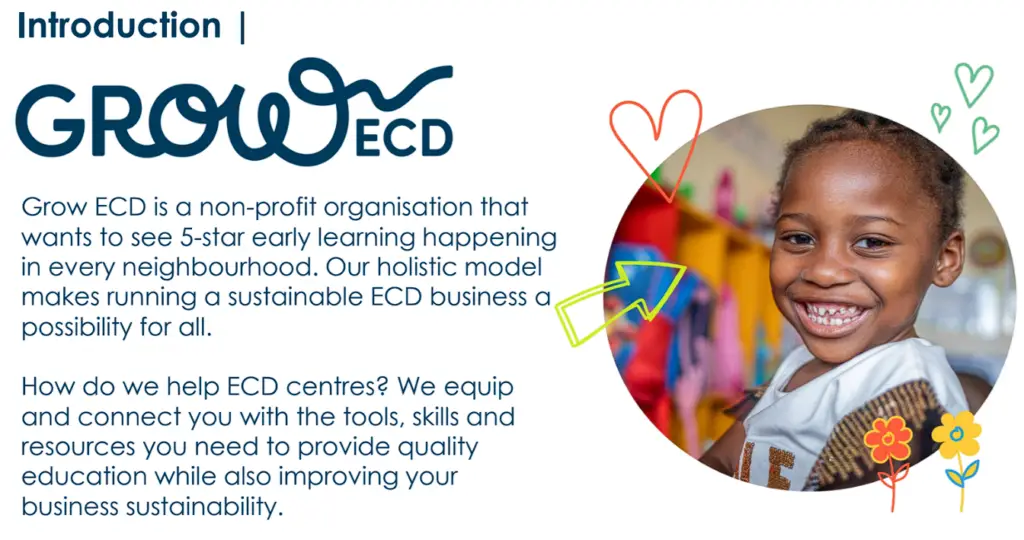In May 2021, Africa A+ Schools embarked on an exciting field trip to Malungeni in the Eastern Cape. The four day workshop introduced the local ECD teachers to iZinto i.e. the using of discarded, found and everyday materials as resources in their ECD centres. iZinto is a Xhosa word meaning “things”. In preparation, the Cape Town team curated boxes using the materials stored at their Cape Town iZinto facility. Each box consisted of exciting loose parts such as bottle tops, paper towel rolls, pre-cut rectangular wood floor pieces, cones from cotton reels, corks, string and collections of large caps from aerosol sprays. Most of the materials were gathered from businesses or collected from households. All the materials offered opportunities for children to explore, build, design and problem solve. The materials also offered opportunities for hands on engagement in mathematics in activities like counting, sorting and comparing games. During the four days the A+ facilitators 1) modelled quality learning experiences at the
preschools in the morning and 2) facilitated workshops in the afternoons:

1) Modeling quality learning experiences.
The mornings were spent visiting the Malungeni ECD centres; first Libhongo Preschool and then Vulolwethu ECD Centre. The facilitators worked with the teachers and children as they engaged in different activities using the iZinto materials. The children participated in movement rings and problem solving activities using the box of iZinto materials supplied to the school. The facilitators modelled storytelling with loose materials, counting and sorting games and playing creatively with playdough. The youngest children spent time with heuristic play materials e.g. bottles filled with different materials to encourage explorations with sound, tactile play with assorted brushes, and threading using pipe cleaners and colanders. The teachers were able to observe that creative teaching and learning can occur with materials we discard every day. Expensive resources are not needed to create fun and engaging learning experiences for children. The facilitators (who did not speak iXhosa) were provided with a translator.
Workshops
“I hear and I forget, I see and I remember, I do and I know” (Chinese Proverb) was the inspiration for the workshops. The idea that children learn by using their hands in the “doing” was an important theme running through the programme:
Workshop 1 began with the question, “What do you want for the child that you love?” Links were made between children having access to a quality early education and a happy and productive adulthood (https://highscope.org/perry-preschool-project/). The box of loose parts, iZinto, was introduced and the participants explored the idea of “open-ended” materials.
Workshop 2 introduced the participants to different teaching styles by role playing two different teaching styles. Participants discuss what the children might learn from each teacher and the impact on children’s learning.
Workshop 3 focused on the importance of “free drawing” in early learning. The participants explored making different kinds of lines on the paper and drawing their portraits. Connections were made between drawing and the development of writing skills in children.
Workshop 4 was a “makers” workshop. The ECD teachers actively engaged in making heuristic play resources for their centres e.g. playdough, skittles, number and bottletop sets and sound bottles. A comparison was made between the enjoyment experienced by the ECD teachers and how children feel when exciting and inspiring materials are available for learning. All four workshop helped the participants to get in touch with and enjoy their own creativity. If we want our ECD teachers to nurture children’s creativity, then we need to make sure they are in touch with and enjoying their own creativity!
The written reflections from the ECD teachers suggested that they were inspired by the four day programme:
● “I want to make them [children] enjoy each and every class we have.”
● “I would like for the workshop to last a bit longer. It was helping a lot and it is mind
opening.”
● “I will never look down at the resources like bottle tops they are everywhere.”
● “I learnt that children must draw every day.”



